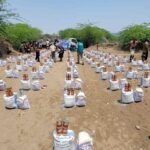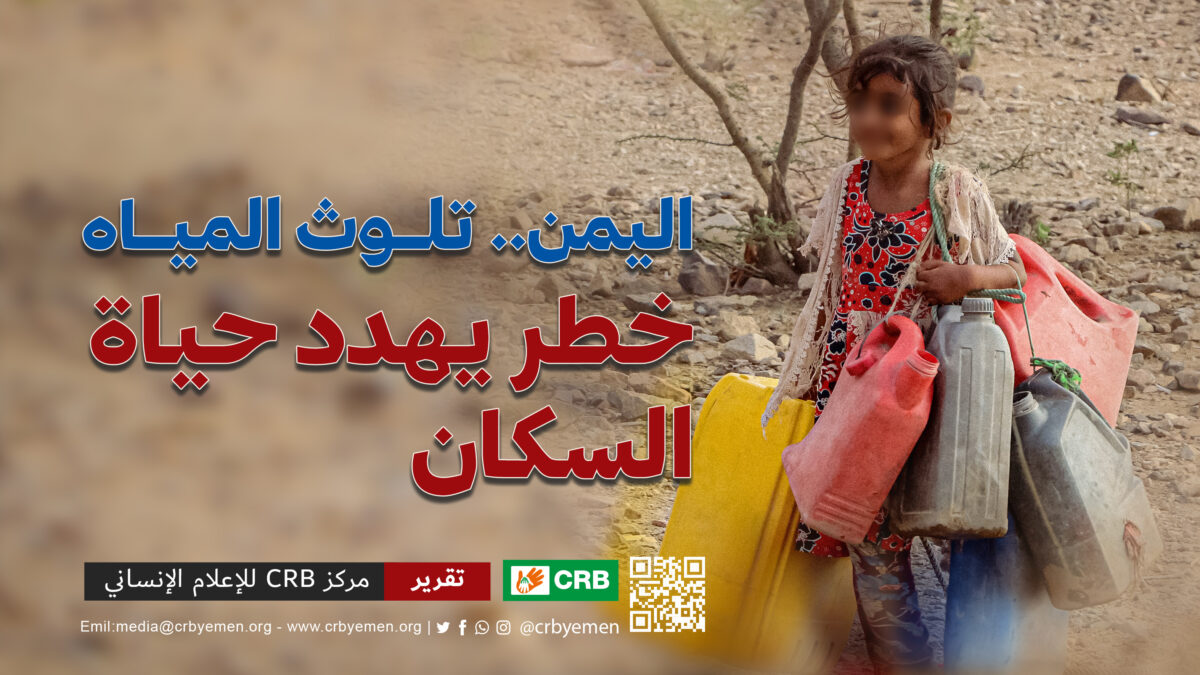
Coalition of Relief and Building Distributes urgent Relief Aid to those affected by Rain in Hodeida
August 12, 2024
Coalition of Relief and Building Enhances Humanitarian Capacities in Aden
August 18, 2024Every morning, a child named “Haitham” goes to a water distribution point that a humanitarian organization supplies via water tank trucks, in a displacement camp where the child lives with his family. The child carries on his back plastic containers that he and his brother used to bring water to meet their needs for drinking water and household use.
The child Haitham Mohammed, a displaced person in Al-Samdah camp in Marib governorate, suffers a lot to provide water for his family, as he goes through great difficulties while going under sun heat to bring water. But he can barely get enough for him and his family during the day due to the great number of people crowding at this point.
Haitham’s family is one of hundreds of thousands of Yemeni families who lack clean and healthy water to drink and use because of the non-stop suffering that goes along with Yemenis and becomes worse by the nine-year war engulfing the country. The war has created an economic crisis, leaving families unable to provide basic life requirements, especially clean water that requires exorbitant amounts of money to obtain. As they no longer afford to buy it, they forcibly rely on available free-provided water that may be polluted. Despite the ongoing suffering that Yemenis face in obtaining water that is available in small and insufficient quantities, it has become a big concern for them because of being polluted, borne-diseases as well as the scarcity of clean and healthy water in Yemeni cities that suffer from a high density in the number of IDPs like Marib and Taiz.
Water in Marib
In this regard, the deputy director of Marib Public Health and Population Office Nasser Abdurabuh Al-Saeedi, speaks about many diseases caused by unclean water. To support that, he makes mention of cholera, as an example of the most diseases caused by polluted water. He mentions other diseases that may be caused by polluted water such as food poisoning or stomach disorder,, diseases resulted from salt in kidneys, kidney failure, smallpox, and hepatitis A.
The World Health Organization has confirmed that water pollution and poor sanitation services are linked to diseases transmission such as cholera, diarrhea, dysentery, hepatitis A, typhoid, and polio. The lack of water and sanitation services, or their insufficient availability or mismanagement, exposes individuals’ health to avoidable risks. This is especially true in healthcare facilities, where patients and staff are in danger to greater risks of infection and disease when water, sanitation, and hygiene services are lacking”, according to the organization’s website.
In his interview with Humanitarian Media Center, Al -Saeedi adds : “The more people drink or obtain clean and potable water, the better their health will be. because as is known, the human body is made up of 75% water, and if the water is clean, people will be very healthy, and if the water is polluted, people’s health will certainly be poor and unstable and will not be free of many diseases that it may cause.
Marib Health Office deputy director goes on explaining, “As for how to get clean water, this is sometimes related to the sewage system in cities and rural areas, particularly those areas that depend on water sources from wells, which may be close to sewers, or are often fed by them. Therefore, we need to build desalination plants for areas that have difficulty obtaining clean water, including Marib, which contains a large number of displaced people, as well as work on radical solutions to replace the tankers (water tanks) that supply neighborhoods in cities, because they are a source of polluted water and are considered one of the most dangerous things for residents and transmit diseases contained in water.”
He emphasizes: “There is an important point that we must pay attention to in order to obtain healthy and pure water. That is chlorinating and sterilizing water, and this must be provided and supplied by humanitarian organizations and those working in the field of relief, as well as establishing desalination plants, and providing large tanks, particularly in IDPs sites to protect them from any diseases that polluted water may cause.”

